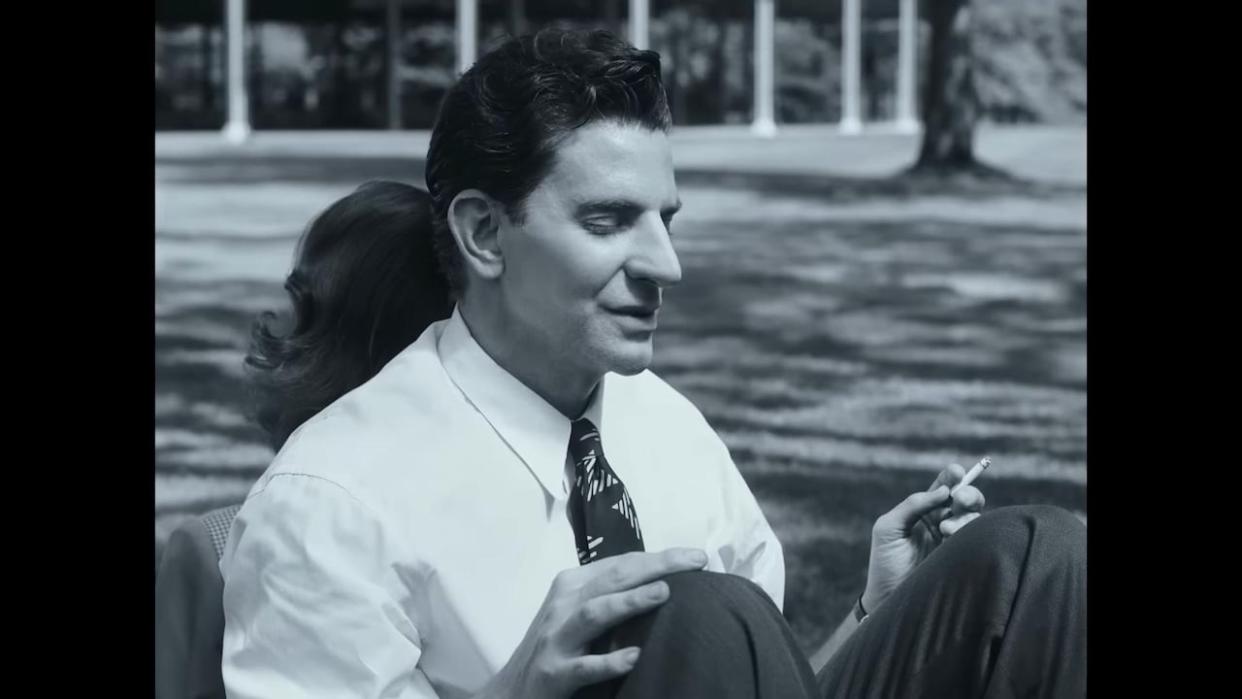Bradley Cooper wore a fake nose to play a Jewish composer. Critics say it plays into antisemitic tropes

A trailer for Maestro, an upcoming biopic about the late Jewish-American composer and conductor Leonard Bernstein, was released on Tuesday — but director and star Bradley Cooper was criticized for wearing a prosthetic nose to portray Bernstein, with some calling it antisemitic.
Historically, antisemitic caricatures have depicted Jewish people as having exaggerated physical traits such as hooked noses and beady eyes, an ethnic stereotype that has been used to justify the marginalization of Jews.
"I had actually seen some stills of Bradley Cooper in this role a few months ago. So I remember when that was first released, I saw the prosthetic nose and then the trailer kind of reignited this topic of conversation," said Molly Tolsky, the editor of Jewish pop culture sites Hey Alma and Kveller.
"And I have to say, my initial reaction is like: Was the nose necessary?
"It didn't feel good," Tolsky said. "It's really hard to separate it from those very well-known antisemitic caricatures of Jews that have been used for hundreds of years throughout history to persecute Jewish people."
WATCH | Bradley Cooper plays Leonard Bernstein in Maestro:
Long history of antisemitic caricatures
Some social media users posted side-by-side screenshots of Cooper in the film and the real Leonard Bernstein to show the difference.
"Just looked up a picture of the real Leonard Bernstein," one person wrote on X, formerly known as Twitter. "The big antisemitic prosthetic nose on Bradley Cooper was definitely not necessary."
Henry Bial, a professor of theatre and dance at the University of Kansas who wrote the book Acting Jewish, said that the use of prosthetic noses to caricature Jewish people has a long history dating back to medieval times.
"The idea in medieval Christian theatre was that the inner deformity of the Jewish soul was mirrored by the outward deformity of the hooked nose ... and sometimes a hunchback and other types of misshapen features," he said. "Then that gets picked up and repeated in antisemitic caricatures and art."
Bial said there is an increased sensitivity to portrayals like Cooper's because antisemitic rhetoric and violence against Jews are on the rise across North America and in Europe.
"As Jews, we are very concerned about how we're being represented these days," Bial said. "That makes us very nervous when we see this kind of ancient trope being repeated."
Bernstein's family says it's OK
The film recounts Bernstein's life and romance with his wife, Felicia Montealegre. Bernstein, who in a 1990 New York Times obituary was called "one of the most prodigally talented and successful musicians in American history," is best known for composing the music for the Broadway musical West Side Story, among other scores, and for conducting symphony orchestras, including the New York Philharmonic.
His family released a statement in response to the criticism, saying that they worked closely with Cooper throughout the film's development and were unbothered by the prosthetic.
"It happens to be true that Leonard Bernstein had a nice, big nose," the statement, signed by his children Jamie, Alexander and Nina Bernstein, read in part. "Bradley chose to use makeup to amplify his resemblance, and we're perfectly fine with that."
While she said she was glad that Bernstein's family was involved closely in the project, Tolsky said it's unfortunate that Cooper's roles as star, director, co-producer and co-writer were not given to Jewish talent. She added that, like others in the Jewish community, she doesn't always feel one way about non-Jewish actors playing Jewish characters.
"We're not a monolithic group of people, and I think where this gets tricky [is] when you compare it to other cultures, other races who are also pushing for more authentic representation. Jews are not one race. We're not one ethnicity. We're not one background. Jews come in all colours, come from all places."
Debate around non-Jewish actors playing Jews
Comedian Sarah Silverman coined the term "Jewface" in 2021, referring to when a non-Jewish actor plays a Jewish person in a film or TV show.
The term itself has drawn a mixed reaction from the community, being a play on the term "Blackface," in which white minstrel performers darkened their skin to mock Black people. One of the most famous instances of Blackface occurred when Jewish comedian Al Jolson darkened his skin in the 1927 musical The Jazz Singer.
The practice of casting a non-Jewish person to play someone who's Jewish has a long history and was so common that it spawned the idiom "write Yiddish, cast British" during the days of old Hollywood.
Silverman's comments were made after actor Kathryn Hahn, who is not Jewish, was tapped to play late comedian Joan Rivers in a limited series — but she noted that it was an ongoing trend in the entertainment industry.
As in Cooper's case, Helen Mirren wore a prosthetic nose to play former Israeli prime minister Golda Meir in a biopic that will be released later this month. Rachel Brosnahan, who is not Jewish, played the lead role in the popular TV series The Marvelous Mrs. Maisel, about a Jewish housewife in 1960s New York who embarks on a comedy career.
WATCH | Helen Mirren portrays Golda Meir in the trailer for Golda:
Another recent example came from the theatre world. Katerina McCrimmon was cast to play comedian Fanny Brice in Funny Girl, a 1960s musical about the Jewish vaudeville performer's life and romances. Brice has most recently been depicted by Jewish actors Lea Michele and Beanie Feldstein, and the role was originated on Broadway by Barbra Streisand.
However, the term "Jewface" implies an intention to mock or dehumanize Jewish people, emphasizing a perceived otherness — which isn't what Cooper is doing, said Bial of the University of Kansas.
"He's not trying to emphasize or dehumanize Bernstein. He's doing exactly the opposite: He's trying to humanize himself."


